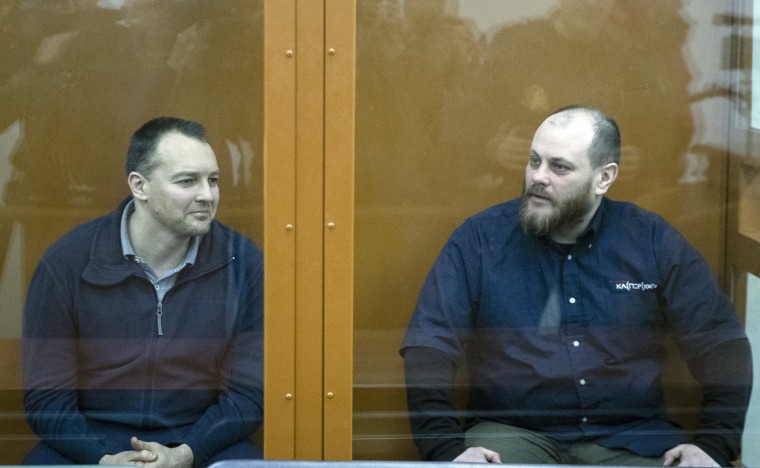MOSCOW — A court in Moscow on Tuesday sentenced a senior Russian cyber intelligence official and an executive at a cybersecurity firm to lengthy prison sentences on treason charges.
Moscow's District Military Court, which has been hearing the top-secret case for nearly two years behind closed doors, sentenced Col. Sergei Mikhailov, former deputy head of the FSB's Information Security Center, to 22 years in prison and a fine.
It also sentenced Ruslan Stoyanov, an executive at the Kaspersky Lab cybersecurity firm, to 14 years in prison and a fine.
The two men listened to the sentencing from inside a glass cage, flanked by masked men.
Mikhailov was also stripped of his colonel's rank and military decorations which included the elite "For Services to the Fatherland."
Details of the case remain murky. Some suggested that the arrest was linked to the Russian hacking of the 2016 U.S. presidential election and a hunt for a possible mole who tipped off U.S. intelligence agencies about Russian interference. Later reports indicated that Mikhailov was prosecuted for passing on details about an unrelated case to an American cybercrime analyst.
Several Russian media outlets including Kommersant reported that the case centers on accusations that Mikhailov contacted Stoyanov to pass confidential information from a probe into activities of Russian businessmen Pavel Vrublevsky to a cybercrime analyst with alleged ties to the FBI.
Inga Lebedeva, Stoyanov's lawyer, was unable to give details on Tuesday because of the secrecy of the case. But she said after the verdict that it did not mention potential meddling in the U.S. elections, and was based solely on Vrublevsky's testimony.
Vrublevsky, who denied the accusations, told The Associated Press that Mikhailov has abused his position at the FSB to go after Internet entrepreneurs like him and "turn them into cybercriminals", thus "whipping up cyber hysteria around the world."
Moscow's District Military Court, which has been hearing the top-secret case for nearly two years behind closed doors, sentenced Col. Sergei Mikhailov, former deputy head of the FSB's Information Security Center, to 22 years in prison and a fine.
It also sentenced Ruslan Stoyanov, an executive at the Kaspersky Lab cybersecurity firm, to 14 years in prison and a fine.
The two men listened to the sentencing from inside a glass cage, flanked by masked men.
Mikhailov was also stripped of his colonel's rank and military decorations which included the elite "For Services to the Fatherland."
Details of the case remain murky. Some suggested that the arrest was linked to the Russian hacking of the 2016 U.S. presidential election and a hunt for a possible mole who tipped off U.S. intelligence agencies about Russian interference. Later reports indicated that Mikhailov was prosecuted for passing on details about an unrelated case to an American cybercrime analyst.
Several Russian media outlets including Kommersant reported that the case centers on accusations that Mikhailov contacted Stoyanov to pass confidential information from a probe into activities of Russian businessmen Pavel Vrublevsky to a cybercrime analyst with alleged ties to the FBI.
Inga Lebedeva, Stoyanov's lawyer, was unable to give details on Tuesday because of the secrecy of the case. But she said after the verdict that it did not mention potential meddling in the U.S. elections, and was based solely on Vrublevsky's testimony.
Vrublevsky, who denied the accusations, told The Associated Press that Mikhailov has abused his position at the FSB to go after Internet entrepreneurs like him and "turn them into cybercriminals", thus "whipping up cyber hysteria around the world."
